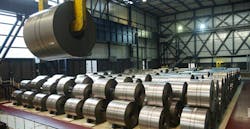As Trump Tariffs Bite, Firms Dangle Cash Prizes in Lobbying Push
Some U.S. companies anxious for exclusions from Donald Trump’s tariffs are turning to creative ways to get the president’s attention.
One Texas steel pipe maker is promising that it will invest millions and hire new workers in return for a temporary break on tariffs. It’s also offering its employees cash prizes for writing the best postcards to Trump advocating for their case.
Other companies are encouraging workers and customers to join letter-writing campaigns and are teaming up with lawmakers to lobby on their behalf.
“I didn’t know that this would do anything, and I still don’t know, but I’ve got a good feeling about it,” said Joel Johnson, chief executive officer of Borusan Mannesmann Pipe U.S. Inc., which is pitching the investment deal to Trump for its pipe mill and finishing facilities in Baytown, Texas. “I can’t stand by and just not do anything.”’
The Commerce Department has been flooded with almost 19,000 requests so far to have products excluded from Trump’s steel and aluminum tariffs. Borusan Mannesmann and other companies are resorting to unconventional means to persuade the administration that the duties, which are intended to help manufacturing, will actually hurt U.S. production and jobs.
‘Pretty Painful’
“It’s already pretty painful to begin with, and if we don’t get the exclusion, it’s going to be worse for us,” said Ty Taylor, president of South Carolina-based Greenfield Industries Inc., who said that the tariffs are cutting into the company’s profits. Greenfield has asked employees and sales people to write letters seeking support for more than 1,100 exclusion requests.
“We almost feel like the government’s telling us we need to stop manufacturing here and move our manufacturing offshore,” Taylor said.
Companies are asking for exclusions from the 25% tariffs on steel imports and 10% on aluminum that Trump imposed in March and expanded on June 1 by removing temporary country exemptions for the European Union, Canada and Mexico. Requests can be approved if the needed raw material isn’t produced in the U.S. in a sufficient amount or quality, or for a specific national security reason.
Exclusions Deal
Borusan Mannesmann, which wants exclusions for the pipe it imports from its parent company in Turkey, is facing added annual costs of $25 million to $35 million from the tariffs, Johnson said. The company has pledged to spend $75 million on a new mill and finishing facility and hire as many as 170 workers if it gets the exclusions, including a previously planned $25 million investment.
To drum up support for its request, the company collected 4,500 postcards from its 275 employees and their relatives. They wrote to 15 officials, including Trump, Commerce Secretary Wilbur Ross and Energy Secretary Rick Perry, a former governor of Texas. The idea is “to get the government’s ear,” the company said.
Borusan Mannesmann is holding two contests with cash prizes totaling $6,250 for the best-written postcards, as well as for the best submission from an employee’s child and other family member. Workers were encouraged to describe what they do, what their job means to them, and what opportunities a new factory would mean to them.
‘Home Away From Home’
In one handwritten postcard provided by the company, a steel worker named Manuel wrote to Trump saying his job is his “home away from home.”
“It’s not just Borusan asking for your help but I need your help my family needs your help and Baytown Tx needs your help,” he wrote. “Like you always say, ‘Let’s Make America Great Again.’ So why not with Borusan Mannesmann?”
NLMK USA, which imports steel slab from its parent company in Russia as well as from other other countries and rolls it into steel coils and other products, is absorbing the tens of millions of dollars in tariff costs but will have to look at alternatives, including cutting jobs, if it can’t get its exclusions, Chief Executive Officer Bob Miller said.
The company, based in Farrell, Pennsylvania, on the border with Ohio, employs 750 people at facilities in western Pennsylvania and 350 in Indiana, Miller said. The firm has asked Pennsylvania’s two U.S. senators, representatives and even its own customers to write to the administration to support their exclusion requests, he said.
Trump Meeting
Representative Mike Kelly, a Pennsylvania Republican whose district includes NLMK, personally met with Trump and other lawmakers on Feb. 27 and raised the issue of how tariffs would affect the company, according to Tom Qualtere, a Kelly spokesman.
“This region is on his radar, and I think the message is getting to him,” Miller said by phone.
Greenfield Industries, which makes drill bits and other products, gave a sample letter to all of its 300 employees and a list of local and national politicians to contact, with a plea that “we need to work together to get Greenfield exempted from this tariff.”
The sample letter provided by the company describes how the firm faces a 25% tariff on imported steel, but there’s no duty on competing imported finished tools. “This will create an unfair situation and could impact our business and jobs,” the letter said.
‘Out-of-State’
Brian Peters, operations manager at American MSC Inc., which makes springs for automotive use with 180 employees in Troy, Michigan, said he was even working with an out-of-state lawmaker, Representative Jackie Walorski from Indiana, to get help with his exclusion requests.
Walorski’s office has reached out to all companies that submitted exclusion requests after a recent meeting with Ross where she raised her concerns about the process and the secretary expressed skepticism about the legitimacy of reports of problems, according to Walorski spokesman Jack Morrissey.
“We just can’t go to our customers and raise prices,” Peters said.
By Mark Niquette
About the Author
Bloomberg
Licensed content from Bloomberg, copyright 2016.
